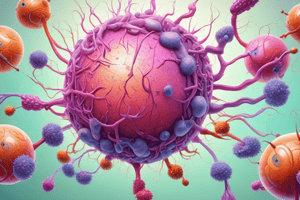Podcast
Questions and Answers
What is the function of lysozyme in saliva and tears?
What is the function of lysozyme in saliva and tears?
- Inhibits microbial growth in the mouth
- Breaks down the cell walls of bacteria (correct)
- Generates reactive oxygen species
- Neutralizes stomach acids
Which cells engulf and destroy foreign particles like bacteria, viruses, and cancer cells?
Which cells engulf and destroy foreign particles like bacteria, viruses, and cancer cells?
- Monocytes
- Macrophages
- Natural killer cells
- Neutrophils (correct)
How do neutrophils eradicate pathogens once they enter infected sites?
How do neutrophils eradicate pathogens once they enter infected sites?
- Causing target cell death
- Breaking down cell walls of bacteria
- Releasing enzymes and generating reactive oxygen species (correct)
- Inhibiting microbial growth
Which cells do not require prior antigen exposure to recognize and eliminate virus-infected cells and tumors?
Which cells do not require prior antigen exposure to recognize and eliminate virus-infected cells and tumors?
What is the role of natural killer (NK) cells in controlling viral infections and cancer?
What is the role of natural killer (NK) cells in controlling viral infections and cancer?
How can genetic variations in innate immune elements affect disease resistance and susceptibility?
How can genetic variations in innate immune elements affect disease resistance and susceptibility?
What is the primary function of non-specific host defenses in the human body?
What is the primary function of non-specific host defenses in the human body?
Which type of immunity includes physical barriers as a defense mechanism?
Which type of immunity includes physical barriers as a defense mechanism?
What is the role of mucous membranes in non-specific host defenses?
What is the role of mucous membranes in non-specific host defenses?
Which type of immunity involves the production of antibodies?
Which type of immunity involves the production of antibodies?
How do non-specific host defenses contribute to infection control?
How do non-specific host defenses contribute to infection control?
Which immune response is less targeted but plays a critical role in health maintenance?
Which immune response is less targeted but plays a critical role in health maintenance?
Flashcards are hidden until you start studying
Study Notes
Non-Specific Host Defenses
Non-specific host defenses refer to innate immune responses within the human body that do not target specific pathogens. These defense mechanisms protect against a broad range of potential threats and play a critical role in maintaining overall health.
Overview of Non-Specific Host Defenses
The human immune system is composed of both innate and adaptive immunity. Innate immunity includes non-specific host defenses such as physical barriers like skin and mucous membranes, chemical barriers like stomach acid and saliva, and cellular components like phagocytes and natural killer cells. Adaptive immunity, on the other hand, involves the production of antibodies and memory cells, which specifically recognize and remember individual pathogens for a more effective response in the future.
While non-specific host defenses are less targeted compared to adaptive immunity, they serve important functions in preventing infection and disease. They act quickly during the initial stages of infection and can often control the spread of pathogens until adaptive immunity develops.
Physical Barriers
Physical barriers are the first line of defense against external pathogens. Skin serves as the primary physical barrier, protecting internal tissues from direct contact with microbes. Mucous membranes also prevent entry by trapping pathogens and forming a protective layer over epithelial surfaces. For example, the digestive tract has a thick layer of mucus that helps neutralize stomach acids and ward off bacteria. Similarly, saliva contains enzymes and antimicrobial agents that prevent bacterial growth in the mouth.
Chemical Barriers
Stomach acid helps kill ingested pathogens, maintaining a continuously acidic environment within the stomach to inhibit microbial growth. In addition, lysozyme, an enzyme present in saliva and tears, breaks down the cell walls of bacteria, contributing to their destruction.
Cellular Defenses
Phagocytes, such as neutrophils, macrophages, and monocytes, engulf and destroy foreign particles like bacteria, viruses, cancer cells, and other debris. Natural killer cells recognize and eliminate virus-infected cells and some types of tumors without prior exposure to these pathogens. These cellular defenses play a crucial role in controlling infection until adaptive immunity develops.
Phagocytes
Neutrophils are the most abundant type of white blood cells and make up about 50-70% of circulating phagocytes. They enter infected sites through chemotaxis, and once there, they engulf pathogens, release enzymes, and generate reactive oxygen species to eradicate them. Macrophages also contribute to non-specific immune responses by phagocytosing dead cells and clearing out damaged tissue caused by pathogens. Monocytes are precursors to macrophages, which differentiate into macrophages when they encounter foreign materials.
Natural Killer Cells
Natural killer (NK) cells are cytotoxic lymphocytes that do not require prior antigen exposure. They express activating Fc receptors and inhibitory NK cell receptors that regulate their activity. NK cells are essential in controlling viral infections and cancer. When activated, they release cytotoxic molecules causing target cell death, either directly or indirectly by promoting apoptosis.
Innate Immunity's Role in Disease Resistance and Susceptibility
Non-specific host defenses play a vital role in shaping disease resistance and susceptibility. Genetic variations in innate immune elements can influence an individual's susceptibility to infectious diseases. For example, individuals with genetic mutations leading to increased complement activation are more susceptible to severe sepsis due to excessive inflammation and damage to the endothelium. Similarly, polymorphisms affecting the expression of toll-like receptors (TLRs) and nuclear factor-kappa B (NF-κB) signaling can affect the risk of developing certain infections.
Manipulation of non-specific host defenses is also being explored as a potential therapeutic strategy in infectious diseases and cancer. For instance, recombinant human IFN-γ has been tested for its ability to enhance macrophage function against Mycobacterium tuberculosis infection. Similarly, natural killer cells can be isolated from patients with advanced cancer and expanded ex vivo before adoptive cell therapy to improve tumor clearance. These approaches hold promise in augmenting existing immune responses or targeting specific pathways within innate immunity for improved disease outcomes.
In conclusion, non-specific host defenses represent a crucial aspect of the human immune system, providing rapid and broad protection against a wide range of external threats. While these defense mechanisms may not have the same level of specificity as adaptive immunity, they play a critical role in maintaining health and controlling the spread of pathogens until more targeted responses can develop. Understanding the intricacies of non-specific host defenses offers valuable insights into how we might harness them for therapeutic purposes, ultimately improving our ability to combat and manage various diseases.
Studying That Suits You
Use AI to generate personalized quizzes and flashcards to suit your learning preferences.



